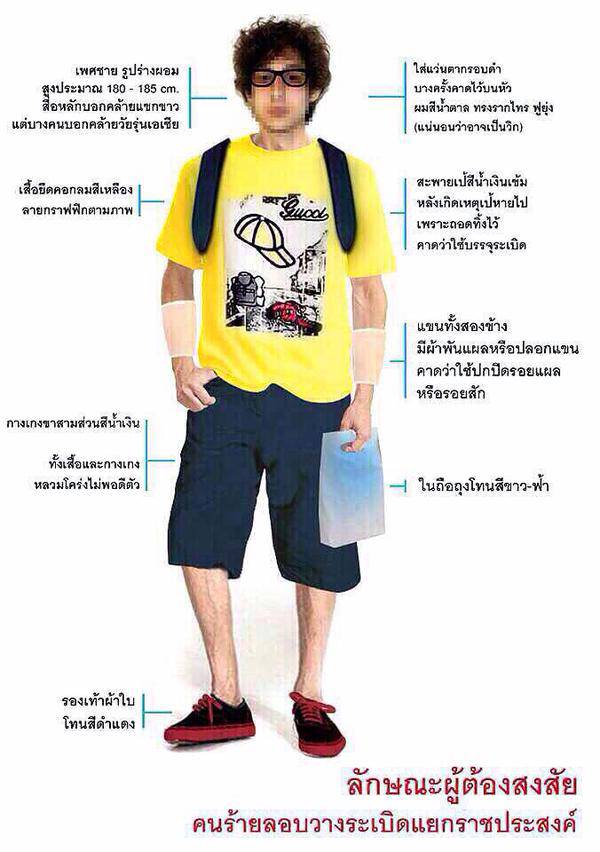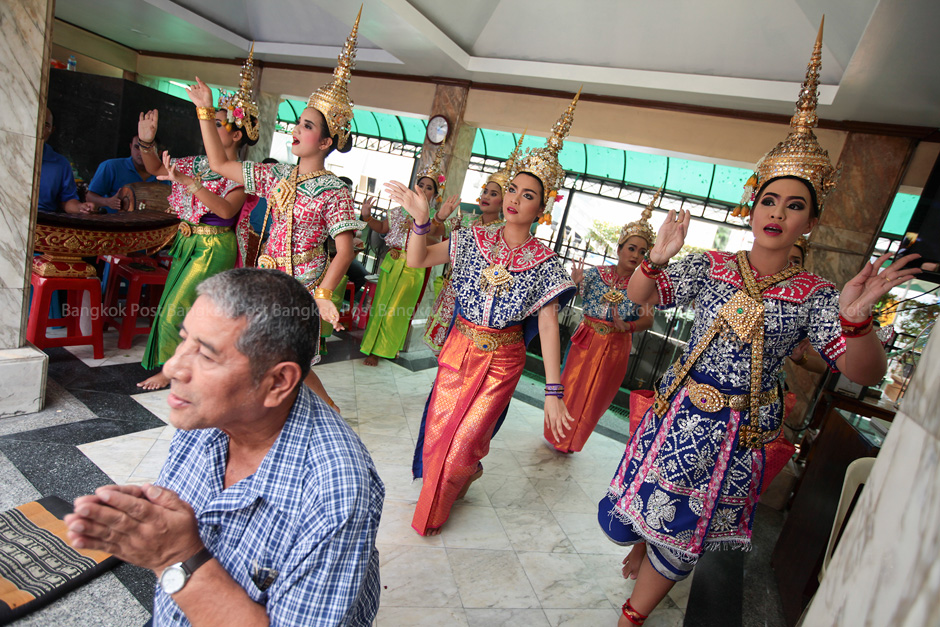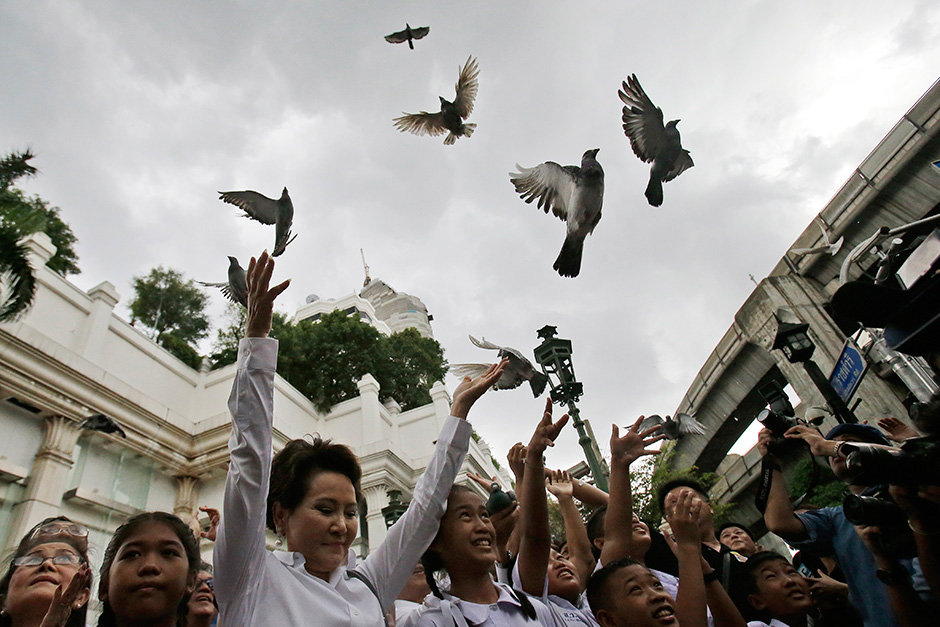-
IP addresses are NOT logged in this forum so there's no point asking. Please note that this forum is full of homophobes, racists, lunatics, schizophrenics & absolute nut jobs with a smattering of geniuses, Chinese chauvinists, Moderate Muslims and last but not least a couple of "know-it-alls" constantly sprouting their dubious wisdom. If you believe that content generated by unsavory characters might cause you offense PLEASE LEAVE NOW! Sammyboy Admin and Staff are not responsible for your hurt feelings should you choose to read any of the content here. The OTHER forum is HERE so please stop asking.
You are using an out of date browser. It may not display this or other websites correctly.
You should upgrade or use an alternative browser.
You should upgrade or use an alternative browser.
Huge explosion rocks central Bangkok - casualties reported
- Thread starter singveld
- Start date

BANGKOK: — The San Jose Mercury News, one of the most important newspapers in California, was left with egg on its face after it printed a headline declaring that the Bangkok bombing happened in Taiwan.
“Taiwan hunts for shrine bomber” reads the headline, which will probably lead to the firing of a copy editor.
Because Asia is so far away, apparently some Westerners still confuse Thailand and Taiwan… and this in the age of Google.
The wire story from the AP was written by Thai reporters one of whom took to Facebook to defend herself, saying that it was the newspaper changed the headline.
Thai Junta chief and Prime Minister Prayuth was reportedly impressed by the progress and order of Singapore during a recent trip there, even commenting that Thailand would be better off if its media followed the Singaporean model. This model includes tight censorship that puts the press at the behest of government initiatives to develop the nation.
Thais have long been impressed by the example of Singapore, a nation-state that exemplifies values Thais have traditionally held dear–order, unity, progress and incorruptibility.
Freedom of speech, assumed to be every society’s highest value by the Westerner, is subsumed in Thai culture by an impulse to cater to those of higher or lower rank and monitor one’s actions and speech so as not to cause offense. Unity, or making the village of one mind, is the highest value. Political ruptures and disagreements are all put down to an impolite lack of unity. Democracy is defined as a unity of opinion and the giving up of one’s viewpoint to cooperate with the whole.
The Thai state is a laissez faire market where greedy competition overwhelms any pretense at impartiality, strong arm tactics rule, and no law ever stands for long. Thais who can afford to travel overseas are stunned by the state of development of Singapore (and even Malaysia) compared to chaotic Thailand.
Prayuth’s praise of Singapore is ironic considering the junta’s campaign to eliminate Thaksin influence from politics. Thaksin was also enamored of the Singaporean model and its obvious success. Politicians in his party even vowed to dole out government services first to areas that voted for his party mimicking the Singaporean tact of prioritizing benefits to areas that voted for the ruling party.
It was this fear of a one-party state dominated by Thaksin and his family that drove the Thai establishment’s continual moves to dislodge from power the parties that Thaksin controlled.
The West is always at a loss to describe the success of a state that does not adhere to its expectations for humanity. Singapore’s restricted media, harsh libel laws, one-party rule, and constrained election procedures are supposed to produce the repression and torpor of a third world dictatorship. However, it somehow produces one of humanity’s great success stories in terms of a successful multi-cultural free market boom town.
It could be that this success is due to Singapore being less a nation than a strategically placed city.
Cities are always best developed under close control of a benevolent government and Singapore’s bureaucracy is tuned to granular optimization of human activity. Singapore’s location at an intersection of world trade routes probably guarantees that whatever state exists there would be a key location in world commerce. Add to that Lee Kuan Yew and his family–perhaps a singular phenomenon of incorruptibility (particularly for the Chinese world)–and we have the miracle of Singapore.
Singapore will continue to be a touchstone for Thais. Singapore is a regional neighbor that seems to validate Thai beliefs about the value of unity for the sake of progress. Thailand, after a decade of political turmoil, continues to search for a formula to create stability and emerge with its traditional values and royal systems in place. Western nations advising “quick elections” miss both the motivations that guide Thai values and the fears of Thaksin absolute rule that stoked one political rupture after another.
The Thai junta-written charter and the machinations that will surround its promulgation will only imperfectly reflect the Singaporean model. With the exception of the inheritance tax, most junta “reforms” have simply been strong-arm tactics to step in where the police are unwilling to enforce local laws. Once the military withdraws, all of these “reforms” will evaporate.
The new charter will reflect the supremacy of the traditional Thai balance of powers. This means non-elected forces will retain the ability to counterbalance elected governments with procedural roadblocks and retrograde reforms designed to prevent the elected, assumed to be self-serving and greedy, from attempting to monopolize power again.
It will take another generation for any real sense of good governance to emerge in the Thai world. What such future governance would look like is the real question. Thai deference for authority and the eschewing of freedom of speech in favor of unity will certainly not go away.
Thailand has already demonstrated its propensity and desire for monolithic governments since the 1997 Thai charter first brought Thaksin and his political clique to power. The present junta continues to float rumors for the necessity of a national unity government, encompassing all parties, after the next election.
So the impulse on both sides is still towards the Singaporean model in the name of development, order, and unity. However, the Thai realization of this model would not be cloaked in incorruptibility nor impartiality–both post-coup governments and Thaksin’s elected proxy parties have demonstrated that. All of these governments–military or elected–have ruled by emphasizing overwhelming force and menace towards those who resist them.
So while Westerners expect quick elections and free speech to solve all of Thailand’s problems, the nation will continue to gravitate towards a wildly imperfect version of the Singaporean model.
Thais have long been impressed by the example of Singapore, a nation-state that exemplifies values Thais have traditionally held dear–order, unity, progress and incorruptibility.
Freedom of speech, assumed to be every society’s highest value by the Westerner, is subsumed in Thai culture by an impulse to cater to those of higher or lower rank and monitor one’s actions and speech so as not to cause offense. Unity, or making the village of one mind, is the highest value. Political ruptures and disagreements are all put down to an impolite lack of unity. Democracy is defined as a unity of opinion and the giving up of one’s viewpoint to cooperate with the whole.
The Thai state is a laissez faire market where greedy competition overwhelms any pretense at impartiality, strong arm tactics rule, and no law ever stands for long. Thais who can afford to travel overseas are stunned by the state of development of Singapore (and even Malaysia) compared to chaotic Thailand.
Prayuth’s praise of Singapore is ironic considering the junta’s campaign to eliminate Thaksin influence from politics. Thaksin was also enamored of the Singaporean model and its obvious success. Politicians in his party even vowed to dole out government services first to areas that voted for his party mimicking the Singaporean tact of prioritizing benefits to areas that voted for the ruling party.
It was this fear of a one-party state dominated by Thaksin and his family that drove the Thai establishment’s continual moves to dislodge from power the parties that Thaksin controlled.
The West is always at a loss to describe the success of a state that does not adhere to its expectations for humanity. Singapore’s restricted media, harsh libel laws, one-party rule, and constrained election procedures are supposed to produce the repression and torpor of a third world dictatorship. However, it somehow produces one of humanity’s great success stories in terms of a successful multi-cultural free market boom town.
It could be that this success is due to Singapore being less a nation than a strategically placed city.
Cities are always best developed under close control of a benevolent government and Singapore’s bureaucracy is tuned to granular optimization of human activity. Singapore’s location at an intersection of world trade routes probably guarantees that whatever state exists there would be a key location in world commerce. Add to that Lee Kuan Yew and his family–perhaps a singular phenomenon of incorruptibility (particularly for the Chinese world)–and we have the miracle of Singapore.
Singapore will continue to be a touchstone for Thais. Singapore is a regional neighbor that seems to validate Thai beliefs about the value of unity for the sake of progress. Thailand, after a decade of political turmoil, continues to search for a formula to create stability and emerge with its traditional values and royal systems in place. Western nations advising “quick elections” miss both the motivations that guide Thai values and the fears of Thaksin absolute rule that stoked one political rupture after another.
The Thai junta-written charter and the machinations that will surround its promulgation will only imperfectly reflect the Singaporean model. With the exception of the inheritance tax, most junta “reforms” have simply been strong-arm tactics to step in where the police are unwilling to enforce local laws. Once the military withdraws, all of these “reforms” will evaporate.
The new charter will reflect the supremacy of the traditional Thai balance of powers. This means non-elected forces will retain the ability to counterbalance elected governments with procedural roadblocks and retrograde reforms designed to prevent the elected, assumed to be self-serving and greedy, from attempting to monopolize power again.
It will take another generation for any real sense of good governance to emerge in the Thai world. What such future governance would look like is the real question. Thai deference for authority and the eschewing of freedom of speech in favor of unity will certainly not go away.
Thailand has already demonstrated its propensity and desire for monolithic governments since the 1997 Thai charter first brought Thaksin and his political clique to power. The present junta continues to float rumors for the necessity of a national unity government, encompassing all parties, after the next election.
So the impulse on both sides is still towards the Singaporean model in the name of development, order, and unity. However, the Thai realization of this model would not be cloaked in incorruptibility nor impartiality–both post-coup governments and Thaksin’s elected proxy parties have demonstrated that. All of these governments–military or elected–have ruled by emphasizing overwhelming force and menace towards those who resist them.
So while Westerners expect quick elections and free speech to solve all of Thailand’s problems, the nation will continue to gravitate towards a wildly imperfect version of the Singaporean model.
‘Facebook Prophet’ Denies He Authored Online Augury
As police officials look on, the Bangkok press corps listens to Pongpob Boonsaree's account of how he came to post a Facebook message predicting an incident would happen in Bangkok days before Monday's deadly bomb attack.
BANGKOK — The man behind a Facebook post that purportedly predicted the deadly bombing in central Bangkok four days in advance met with police today to affirm his innocence in the plot.
Before answering police questions at Bangkok’s Technology Crime Suppression Division, Pongpob Boonsaree, 36, told reporters this afternoon he wasn’t the original author of the seemingly prescient message and only reposted it out of anxiety.
“I was suspicious from the message, and I felt that something bad may happen, and I was worried about ordinary people, so I reposted the message on my Facebook,” Pongpob said, flanked by officers. “I didn’t expect that something would really happen.”
Pongpob confirmed he is indeed Facebook user “Wichawate Pornpromraksa,” which posted a status on Thursday warning people in Bangkok to beware of an unspecified incident between Friday and Tuesday.
Original message warning of unspecified incident and warning Bangkok residents to be careful.
Four days later, a powerful bomb struck the popular Erawan Shrine in downtown Bangkok, killing 20 people and injuring more than 150. The post then went viral through social media, drawing suspicion he may have had advance knowledge of the blast.
The next day, junta chairman and Prime Minister Prayuth Chan-ocha told reporters he had instructed security officers to track down the person behind the prophetic remark for questioning.
“I have already instructed them to summon the posters. Right now we are looking for them,” Prayuth said Tuesday.
Speaking to reporters today, Pongpob said he set the message as his status after copying it from another user called “kaler,” who had posted it in a Facebook group that draws political discussions.
Pongpob said he was working at the office when the blast took place.
“If I was really involved in the incident, I would have fled already,” he said. “Why would I surrender myself to police and insist my innocence today?”
Police lead Pongpob away after he addressed the media this afternoon.
He chose to deactivate his Facebook account, he said, because many people reported it to Facebook administrators. He said he is willing to cooperate with the police in any way he can, such as pinpointing where he first saw the message.
Asked about his political persuasion, Pongpob said he self-identifies as a Redshirt, whose members generally support the government toppled by the current military junta in May 2014.
“I admit I am a Redshirt,” Pongpob said. “I support democracy, but I do not oppose the government or NCPO,” referring to the junta’s formal name, the National Council for Peace and Order. “I am very sad about the bombing. I feel sad for all victims. Thailand is also a victim.”
Pongpob added that he hopes authorities won’t use his case to paint the entire Redshirt movement as “rumormongers” because of his action.
He was then taken away by police officers for interrogation. As of the time of this writing, it is unclear whether he would face any criminal charges.

As police officials look on, the Bangkok press corps listens to Pongpob Boonsaree's account of how he came to post a Facebook message predicting an incident would happen in Bangkok days before Monday's deadly bomb attack.
BANGKOK — The man behind a Facebook post that purportedly predicted the deadly bombing in central Bangkok four days in advance met with police today to affirm his innocence in the plot.
Before answering police questions at Bangkok’s Technology Crime Suppression Division, Pongpob Boonsaree, 36, told reporters this afternoon he wasn’t the original author of the seemingly prescient message and only reposted it out of anxiety.
“I was suspicious from the message, and I felt that something bad may happen, and I was worried about ordinary people, so I reposted the message on my Facebook,” Pongpob said, flanked by officers. “I didn’t expect that something would really happen.”
Pongpob confirmed he is indeed Facebook user “Wichawate Pornpromraksa,” which posted a status on Thursday warning people in Bangkok to beware of an unspecified incident between Friday and Tuesday.
Original message warning of unspecified incident and warning Bangkok residents to be careful.
Four days later, a powerful bomb struck the popular Erawan Shrine in downtown Bangkok, killing 20 people and injuring more than 150. The post then went viral through social media, drawing suspicion he may have had advance knowledge of the blast.
The next day, junta chairman and Prime Minister Prayuth Chan-ocha told reporters he had instructed security officers to track down the person behind the prophetic remark for questioning.
“I have already instructed them to summon the posters. Right now we are looking for them,” Prayuth said Tuesday.
Speaking to reporters today, Pongpob said he set the message as his status after copying it from another user called “kaler,” who had posted it in a Facebook group that draws political discussions.
Pongpob said he was working at the office when the blast took place.
“If I was really involved in the incident, I would have fled already,” he said. “Why would I surrender myself to police and insist my innocence today?”
Police lead Pongpob away after he addressed the media this afternoon.
He chose to deactivate his Facebook account, he said, because many people reported it to Facebook administrators. He said he is willing to cooperate with the police in any way he can, such as pinpointing where he first saw the message.
Asked about his political persuasion, Pongpob said he self-identifies as a Redshirt, whose members generally support the government toppled by the current military junta in May 2014.
“I admit I am a Redshirt,” Pongpob said. “I support democracy, but I do not oppose the government or NCPO,” referring to the junta’s formal name, the National Council for Peace and Order. “I am very sad about the bombing. I feel sad for all victims. Thailand is also a victim.”
Pongpob added that he hopes authorities won’t use his case to paint the entire Redshirt movement as “rumormongers” because of his action.
He was then taken away by police officers for interrogation. As of the time of this writing, it is unclear whether he would face any criminal charges.

Forensic specialist investigating the Ratchaprasong deadly bomb explosion Monday blast have discovered strange bomb shards and shrapnel which they say are not normally seen in devices in past bombings in the country.
Specialists from both the police and military have been collecting shrapnel and bomb fragments at the site since Monday night and what they found was a device that is not normally used in past bombings in Thailand.
Fragments discovered at the blast site are made up of a section of metal tubing and 2 types of metal pellets.
The metal tubing is between 1.5 – 2 cm in thickness and authorities believe it was used to contain the explosives.
More than 100 metal pellets have been collected and they came in 2 sizes.
Some were 0.6 cm in diameter and the remainder was 0.8 cm and was employed as fragmentation to cause maximum damage.
The bomb is believed to have contained high grade explosives but it has not been determined yet whether TNT or C4 explosive was used.
Authorities suspected a timer – either a digital wrist watch or a mobile phone; was used to set the device off.
Earlier Royal Thai Police commissioner Pol Gen Somyot Poompunmuong said, “We have not yet determined the type of explosives material used. What we know is that the device was contained in a metal tube and wrapped with a piece of white cloth.”
The materials used in this device differ from other devices in other past bombings and authorities suspect that the bomber was highly skilled as only 3 – 5 pounds of explosives was used but metal pellets were used to exponentially increase the amount of damage.
The force of the detonation resulted in fatalities at the scene and caused damage on structures as far away as 50 meters.
Buildings on the periphery of the blast such as the Police General Hospital, Gaysorn Plaza and the Hyatt Erawan Hote, some 50-100 metres away, suffered glass damage from debris and the force of the explosion.
But surprisingly, the main Erawan Shrine which sits only five metres from the deadly explosion site, suffered only slight damage.
Specialists from both the police and military have been collecting shrapnel and bomb fragments at the site since Monday night and what they found was a device that is not normally used in past bombings in Thailand.
Fragments discovered at the blast site are made up of a section of metal tubing and 2 types of metal pellets.
The metal tubing is between 1.5 – 2 cm in thickness and authorities believe it was used to contain the explosives.
More than 100 metal pellets have been collected and they came in 2 sizes.
Some were 0.6 cm in diameter and the remainder was 0.8 cm and was employed as fragmentation to cause maximum damage.
The bomb is believed to have contained high grade explosives but it has not been determined yet whether TNT or C4 explosive was used.
Authorities suspected a timer – either a digital wrist watch or a mobile phone; was used to set the device off.
Earlier Royal Thai Police commissioner Pol Gen Somyot Poompunmuong said, “We have not yet determined the type of explosives material used. What we know is that the device was contained in a metal tube and wrapped with a piece of white cloth.”
The materials used in this device differ from other devices in other past bombings and authorities suspect that the bomber was highly skilled as only 3 – 5 pounds of explosives was used but metal pellets were used to exponentially increase the amount of damage.
The force of the detonation resulted in fatalities at the scene and caused damage on structures as far away as 50 meters.
Buildings on the periphery of the blast such as the Police General Hospital, Gaysorn Plaza and the Hyatt Erawan Hote, some 50-100 metres away, suffered glass damage from debris and the force of the explosion.
But surprisingly, the main Erawan Shrine which sits only five metres from the deadly explosion site, suffered only slight damage.
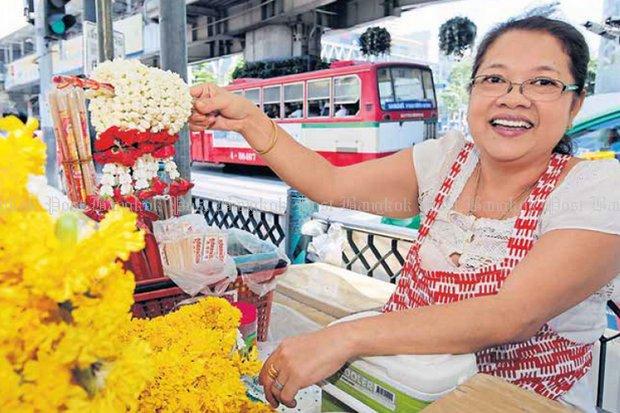
Siriporn Thipphayarat was not at the shrine on Monday, her day off. The garland vendor says she feels safe and is backing security measures implemented following Monday's blast.
For countless people, the Erawan shrine is a place of worship where visitors pray for luck, love, or other fortunes.
But for dozens of flower vendors at the Ratchaprasong intersection, it's their second home.
There are 57 flower stalls -- with almost 100 vendors -- that open throughout the day in the vicinity of the shrine. If any were missing after the Monday blast, they would all know.
"We all know everyone's names by heart," said Supawan Keawanha. She recalled the moment she learned about the blast on Monday evening, when the flower and lottery vendors called each other to check everyone was safe.
Ms Supawan took over the 60-year-old stall from her mother, who had herself inherited it from her grandmother, 17 years ago.
Over the years, the shrine has not just been a workplace for her, but a second home -- a claim echoed by other vendors and regular visitors to the shrine.
"Over half of my life has been spent here," she said, recalling "unforgettable" moments over the past two decades, from the statue being smashed in 2006 -- which she said made her feel as if a parent had been injured -- to the protests by red-shirt and yellow-shirt protesters over the last five years.
Through thick and thin, the stall owners have always stuck together. When demonstrations blocked the Ratchaprasong intersection in 2010 and closed off the streets, the flower vendors quickly switched to selling food to protesters.
Despite riots and street protests, they have always come to work, Jaruwan Sreelek, another vendor, said proudly.
After spending over 12 hours a day and six days a week at the shrine over the past 30 years, most workers in the area are now like family.
They have grown up together, watching their parents trade on Ploenchit Road, while several second or third-generation vendors have married the sons or daughters of neighbouring stall owners.
Most of the vendors fortunately were not at the scene of the bombing, as City Hall has prohibited street vendors from operating on Mondays. One vendor, who broke this law, was injured. Others rushed to the hospital to visit her.
Monday's explosion and the resulting carnage felt different from other events that have played out at the shrine, Ms Supawan said, adding she never anticipated such brutality could happen there.
It was a blessed shrine, and such horror shouldn't have taken place there, said Anuwat Panprayoon, head of the Damrong Thai dance troupe -- one of the four troupes who perform at the shrine every day.
Mr Anuwat, who witnessed the explosion, described the scene as a sea of blood, with human debris flying towards him from the force of the blast.
Neither he nor his dancers were harmed and they will return to work today. He has headed the troupe for 20 years, after his parents left him in charge. "What do you expect me to do, if I can't come back here?" he said sadly.
Nipaporn Thumchan, a regular visitor at the shrine, said the Erawan shrine was like a community.
She feared for the vendors when she first heard of the bombing, and was relieved when she heard the stalls had returned to business as usual yesterday. She was touched to find the flower vendors had worried about her too.
Teary-eyed, she explained that she often dropped by the shrine in the evenings, on her way back from Chulalongkorn Hospital where her ill father is being treated. The shrine is truly sacred, she said, pointing to the statue's chipped chin. It suffered only slight damage in the blast.
"I prayed that Lord Brahma and the shrine can remain binding elements for Bangkokians," Ms Nipaporn added as she made her way out of the crowd of Thais and foreign tourists returning to the site.
Bodies of two women killed in Bangkok bombing flown home to Hong Kong
Two Hongkongers injured in explosion at shrine are taken to hospital for further treatment
PUBLISHED : Friday, 21 August, 2015, 9:29am
UPDATED : Saturday, 22 August, 2015, 1:56am
Chris Lau and Emily Tsang

Vivian Chan's parents travelled to Bangkok when they learned of their daughter's death. Photo: Sam Tsang
The bodies of the two young women killed in Monday's bombing in Bangkok arrived back in Hong Kong yesterday.
Family members were said to still be in a fragile emotional state, but the parents of Vivian Chan Wing-yan, 19, and Arcadia Pang Wan-chee, 24, had been receiving counselling from the Hospital Authority.
"Thanks to the counselling provided by staff members at the Hospital Authority, their emotional states were OK," said Tong Wing-yee, acting senior immigration officer for international cooperation, at Hong Kong International Airport after returning from Bangkok.
The women were killed with 18 others when a bomb exploded at the Erawan Shrine, a Hindu religious establishment in the centre of Bangkok and a popular attraction among East Asian tourists. More than 125 others - six of them Hong Kong residents - were injured.
Chan's father, businessman Allan Chan Sui-wah, thanked Thai authorities for doing their best to save his daughter, a British national who was studying law in the United Kingdom. He told the Bangkok Post earlier that he had been to Thailand several times and thought it would be safe for his daughter for holiday there.
"Before the bomb, she texted a message via WhatsApp to say she would be praying to Lord Brahma and would contact me later, but she did not," he said.
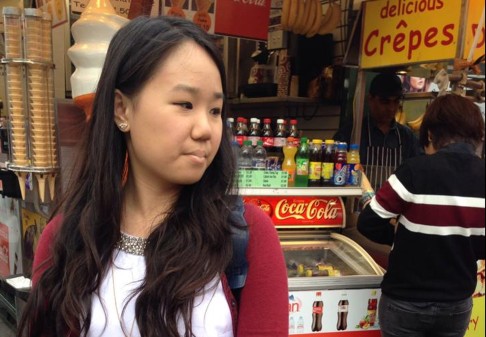
Vivian Chan died in the blast. Photo: SCMP Pictures
Vivian Chan was in Bangkok with Pang, celebrity hairdresser Ben Lee and his girlfriend.
Chan said he had taken the first available flight to Thailand with his wife, after Hong Kong officials informed him of his daughter’s death at 3am on Tuesday.
“[Thai officials and medical staff] took care of my daughter well. I saw signs they had operated on her body. They did their best,” he said.
More than 2,000 people had joined a Facebook tribute page in her honour this morning, writing their memories of the young Hongkonger.
His daughter's body and that of her 24-year-old friend, Pang, were onboard Thai Airways flight TG638, accompanied by Pang's parents who landed at the Chek Lap Kok Airport at about 5.30pm.
The parents were not seen at the arrival halls used by ordinary travellers.
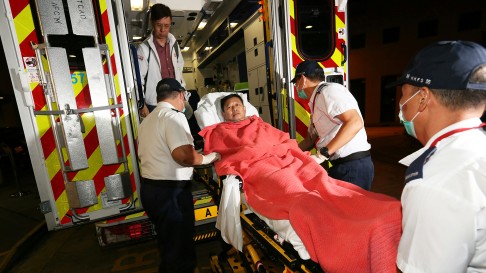
Chu Yat-on, one of the victims of the Bangkok blast, arrives at Nethersole Eastern Hospital in Chai Wan. Photo: Edward Wong
Two other injured Hongkongers, Chu Yat-on, 62, and his wife Jaral Jintana, 60, also returned yesterday and were taken to Pamela Youde Nethersole Eastern Hospital in Chai Wan.
Dr Joe Leung Kai-shing, consultant in the accident and emergency department, said they were in a stable condition.
Chu, who has already undergone three operations, would need surgery on his leg and his wife would be admitted into the neurosurgery department "due to her pre-existing condition".
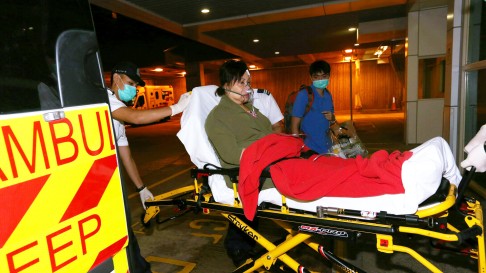
Jaral Jintana, 60-year-old woman from Hong Kong, one of the victims of the Bangkok blast, arrives at Nethersole Eastern Hospital in Chai Wan. Photo: Edward Wong
Tong said this left the number of Hongkongers remaining in Thailand after being caught up in the blast at three, including Jasmine Chu Sum-yu, 9.
"Two immigration officers and one staff member from the Hospital Authority have remained in Thailand to provide them with assistance," Tong said.
"She will need long-term physical therapy and psychological treatment," Leung said, adding she may be left with "serious post-traumatic stress disorder".
Jasmine's father, 61-year-old Chu King-fu, said her mood had picked up. "She knows she's progressed very well. She has been talking and laughing again."
The blast also killed 18 others, including five from mainland China, and injured 125 others.
Additional reporting by Ben Westcott and Shirley Zhao
Chinese visitors flock to Bangkok tourist sites but remain wary after attack
While some have cancelled trips after the attack, many holidaymakers continue to visit
PUBLISHED : Friday, 21 August, 2015, 6:35pm
UPDATED : Saturday, 22 August, 2015, 4:17am
Agence France-Presse in Bangkok

Chinese tourists walk along Khao San road, popular with many foreign visitors, in Bangkok, days after a bomb attack rocked the Thai capital. Photo: AFP
Busloads of visitors from China flocked to Bangkok’s glittering Grand Palace on Friday but, days after a bomb at another of the city’s popular attractions killed five Chinese tourists, Thailand’s biggest spending holidaymakers are rattled.
Monday’s attack on a Hindu shrine, particularly popular with Chinese devotees, did not prevent Jay Chou and his family from travelling to the kingdom, though it has left them on edge.
“We are closely following the news, we shouldn’t go to any place which is dangerous,” said the 18-year-old engineering student from Shanghai outside the palace where an already heavy security presence was boosted in response to the bombing.
The attack on the shrine, apparently by a still-unidentified young man who placed a backpack with explosives under a bench, killed 20 people and injured more than 100 others.
Most of the victims were ethnic Chinese tourists from around Asia, with five of the dead from mainland China and two from Hong Kong.
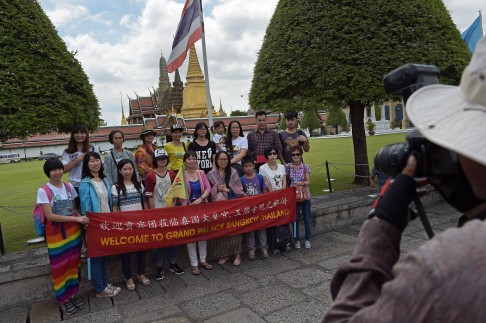
Chinese tourists pose for a group picture before visiting the Grand Palace in Bangkok. Photo: AFP
While Thai authorities have yet to make an arrest or say which group was behind it, they have repeatedly said it was clearly aimed at damaging the tourism industry.
Though in the midst of confusing and sometimes contradictory information on the investigation, one message from authorities has been clear – Chinese tourists were not the target.
So soon after the attack in politically volatile Thailand, which before the coup experienced repeated outbreaks of deadly street violence in a decade-long power struggle, it is difficult to gauge the long-term impact of the blast on tourism.
At a hotel popular with Chinese tourists in Bangkok’s Chinatown, assistant manager Praparat Boonsai said some guests had been frightened away.
“We are worried because our customers are cancelling from China,” she said, saying that six checked out early after Monday’s blast and several had cancelled upcoming trips by phone.
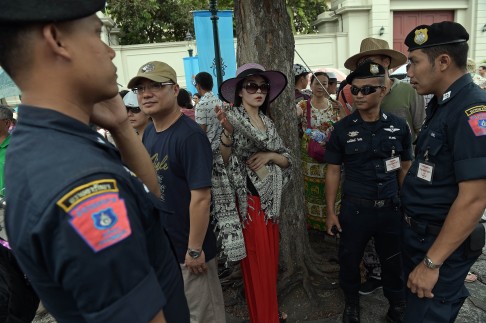
Thai policemen flank a Chinese tourist outside the Grand Palace in Bangkok. Photo: AFP
Woranut Srisamboon, a spokesman for the Thai Chinese Tourist Association, said some tour groups had cancelled trips while holiday agents in China were constantly calling to check on security.
Woranut’s VLC Travel company, catering to mainland Chinese tourists, reported 20 groups of up to 40 people strong had pulled out since Monday.
But Woranut said the impact so far had been limited, putting it down to a ”special relationship” between China and Thailand.
“Thailand and China are like brother and sister,” he said with a smile, saying tourism authorities in both countries were in constant touch.
While Hong Kong warned its residents after the attack to avoid travelling to Bangkok, China’s national tourism body only cautioned its nationals to “be aware, pay attention to travel safety, and choose reasonable travel routes”.
In Bangkok’s historic quarter on Friday, long lines of Chinese tourists followed tour guides, many dressed in identical hats and holding up umbrellas to block the midday sun.
Happily chattering in Mandarin, these groups of travellers had stuck to their long-planned holiday itineraries.
At the entrance of the sprawling palace compound, Chinese tourist Lily Chu said she had continued with her holiday plans despite being worried about safety.
The 33-year-old Buddhist even went to pray at the bombed shrine on Wednesday, believing it was important to pay respects to the dead.
“I prayed for people who died... [so they can] rest in peace,” she said.
Thailand's new police chief in charge of Bangkok blast probe oversaw Koh Tao tourist murders in which police were criticised
PUBLISHED : Saturday, 22 August, 2015, 7:00am
UPDATED : Saturday, 22 August, 2015, 7:00am
Reuters

Chaijinda looks on during a religious ceremony near the Erawan shrine, the site of Monday's deadly blast, in central Bangkok. Photo: Reuters
The investigation into a deadly bombing in Bangkok’s tourist heartland is led by a US-trained officer with close ties to Thailand’s powerful military, who oversaw a high-profile tourist murder case in which the conduct of Thai police was questioned.
Chakthip Chaijinda was chosen as the country’s next police chief on August 14, just three days before a blast tore through the crowded Erawan Shrine in the Thai capital, killing 20 people, mostly foreigners. The current chief retires next month.
Meanwhile, Chakthip is running an investigation which, four days after the Erawan blast, seems no closer to determining who attacked the shrine and why.
READ MORE: Chinese visitors flock to Bangkok tourist sites but remain wary after attack
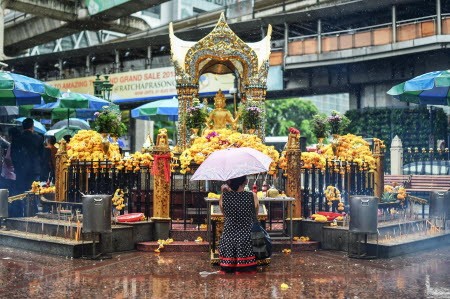
A citizen mourns for the explosion victims at the reopened Erawan Shrine in Bangkok, Thailand. Photo: Xinhua
The prime suspect is an unidentified young man spotted on CCTV apparently leaving a backpack at the scene.
But police and military have issued confusing and sometimes contradictory statements about the suspect’s appearance, the number of accomplices he may have had and the likelihood of foreign involvement.
As deputy police chief, Chakthip has been the public face of other tourism-related cases in which concerns have been raised about the professionalism of the Thai police.
They include the murder of two British backpackers on the island of Koh Tao in September 2014. Two migrant workers from Myanmar are now on trial amid allegations that police failed to properly seal off the crime scene – a criticism also levelled after Monday’s shrine blast – and bungled DNA evidence.
Police have defended their handling of the Koh Tao killings probe and say they have a watertight case.
Chakthip, 55, declined a Reuters request to be interviewed for this story, saying he was too busy.
A Western diplomat in Bangkok described Chakthip as a “straight shooter” who can cut through red tape.
“He’s known to be organised and a decent investigator,” said the diplomat, who requested anonymity.
Thailand’s military seized power in May 2014 and launched a purge of officials deemed loyal to deposed Prime Minister Yingluck Shinawatra and her brother Thaksin.
Within days, Chakthip was made acting commissioner of the Metropolitan Police Bureau, replacing a Thaksin ally.
According to Thai media reports, his recent appointment as police chief was backed by Defence Minister General Prawit Wongsuwan, one of the country’s most powerful men.
“The military trusts him,” said the Western diplomat. “Good or bad, he’s their man.”
There have long been tensions between Thailand’s military and police. That turmoil has been fuelled by a power struggle between a royalist establishment, which is backed by the military, and the political machine of Thaksin, a former police officer with residual support in the force.
Chakthip investigated two bombing incidents earlier this year that wounded a total of nine people in Bangkok and on the resort island of Koh Samui, but “never produced clear findings”, said Paul Chambers, a security expert at the Institute of South East Asian Affairs in Chiang Mai.
Those two incidents and the shrine bombing “could be linked and associated with security officials disgruntled at the junta’s leadership”, said Chambers.
Asked whether security officials might have been involved in the blasts, junta spokesman Winthai Suvaree said: “I don’t think anyone thinks this. Please ask someone else.”
Chakthip received post-blast training at the U.S.-funded International Law Enforcement Academy in Bangkok in 2003 and later attended a course at the FBI Academy in Quantico, Virginia.
“Terrorism and bombings are the biggest challenges that come with the job title,” said Chakthip in a 2011 interview published on a U.S. State Department website.
“There are lots of techniques used by the terrorists and they keep changing, challenging the authorities with new tricks, trying to stay ahead of law enforcement.”
Tourists resembling bomber come under police spotlight
AGENCE FRANCE-PRESSE August 22, 2015 1:00 am
SWEDISH national Marcus Westberg was working on his laptop when police came knocking - he is one of a handful of foreigners being questioned because of their similar looks to the primary Erawan bomb suspect.
Initially Westberg, who is in Thailand on holiday, thought the questioning on Tuesday afternoon in Bangkok was just part of a routine security check.
But then police asked him to account for his whereabouts on Monday evening, the night a deadly bomb tore through the Erawan Shrine in the city centre, killing 20 people and wounding more than 120 others.
"It was not until they asked to see my phone and started going through my photos that I considered that something might be wrong," he said. "They told me that I very much resembled their main suspect."
Other foreigners have found themselves in a similar predicament since the deadly blast as police scramble to locate the suspect and any accomplices he may have had.
Most appear to have come under suspicion because they share a passing resemblance to the primary suspect, seen leaving a backpack under a bench at the shrine just moments before the bomb went off.
A sketch of the alleged bomber released by Thai police, based on closed-caption TV (CCTV) footage and witness descriptions, shows a young man dressed in a yellow T-shirt with dark shaggy hair, a suggestion of stubble and thick-rimmed glasses.
The same day Westberg was being questioned, an Australian model and aspiring actor called Sunny Burns posted a selfie on Instagram from inside a Thai police station. He said he had handed himself in to police after amateur Internet sleuths started posting his details online as a potential bomb suspect.
Multiple Thai news reporters also posted pictures on Wednesday evening of what they said was a dual French-Swiss national, who was briefly detained on arrival at Don Mueang International Airport in Bangkok. He too had shaggy hair and thick glasses.
Westberg, who has a beard and neck-length hair, said his encounter with Thai police was "fairly relaxed" and that officers showed "politeness and professionalism" throughout the one-hour conversation.
"We agreed that the man in the CCTV footage had shorter hair and much less of a beard than I, and after joking with me that perhaps I should get a haircut before venturing outside again. They thanked me for my time and cooperation and apologised for any inconvenience," he said.
"I later found out that it had been entirely by chance: A police officer had seen me earlier on Tuesday, thought that I resembled the suspect and alerted his colleagues," he said.
"That was a relief to find out, I will admit."
Bt10 million in reward offered
THE NATION August 22, 2015 1:00 am

TIP-OFFS SOUGHT ON KEY SUSPECT; BLAST AIMED TO HURT ECONOMY: SOMYOT
THE authorities believe bomb blasts at the Erawan shrine and Sathorn Bridge in Bangkok this week were aimed at discrediting the military government, national police chief General Somyot Poompanmuang has said.
Yesterday, several bomb hoaxes were reported at various locations in the capital.
The National Police Office is now offering up to Bt3million for a tip-off leading to the arrest of the man suspected of planting the bomb at the Erawan Shrine on Monday evening.
This is in addition to a Bt2-million reward that former prime minister Thaksin Shinawatra has offered, according to a Facebook post by his son, Panthongtae. Moreover, Panthongtae said his father would provide another Bt5million to officials who contribute to the arrest, if made.
National Council for Peace and Order spokesman Colonel Winthai Suvari, meanwhile, announced that several agencies believe the blasts were intended to seriously hurt the economy and tourism.
He said inquiries into the blasts were progressing. "But the authorities cannot release details at this point, as that may affect ongoing investigations," he said.
A sketch of the suspected bomber at the Erawan Shrine was released on Wednesday but immigration officials have not spotted him at any checkpoint.
Monday's blast killed 20 people and injured more than 100. The Sathorn Bridge blast did not cause any casualties as it exploded in water near the Chao Phraya River.
Prime Minister Prayut Chan-o-cha yesterday urged the public to be eyes and ears for soldiers and police in a bid to ensure public safety and he called on people to quickly inform the authorities if they see anything suspicious.
However, he said people should not be fearful of the situation to the extent that they stay at home and do not spend money because that would hurt the economy. Several other countries had faced similar security situations or much worse but their people lived normal lives, he said.
"This is our home and country, so don't allow outsiders to play an excessive role. We ought to chart our own future, but we also have to listen to outsiders' voices," he said.
The premier said foreign countries have offered to help the authorities such as the US, which has sophisticated technology that would help with the investigation, especially in terms of identifying a suspect captured on CCTV.
Meanwhile, police yesterday found a suspect package at Benjakiti Park on Ratchadaphisek Road next to Queen Sirikit Convention Centre. When the package was unwrapped, a brand-new rattan ball and sand were found inside, creating the impression it might have been a bomb and causing panic.
A suspicious bag was also found near the Metropolitan Police Bureau. Police said they would summon the taxi driver who left it there for questioning. The owner of the bag told police he accidentally left it in the cab.
Education Ministry permanent secretary Dr Kamjorn Tatiyakavee revealed that an unknown man phoned the ministry and claimed that something bad would happen there.
"Now, we have stepped up security at the ministry compound," he said. "Someone might have wanted to spread a climate of fear."
In related news, examination of CCTV footage has revealed a possible suspect in the Sathorn Bridge attack. Long-distance footage shows the potential suspect walking towards the pier under the bridge on Monday evening - the night before the attack - carrying a plastic bag that could have contained an explosive.
The man kicked the bag into the river around 7.30pm, about half an hour after the Erawan Shrine explosion. He wore a blue shirt and trousers and may not have intended to cause casualties as the bomb exploded in the water.
Police said the suspect could be Thai.
Message of condolence
THE NATION August 22, 2015 1:00 am
THEIR MAJESTIES the King and the Queen have sent condolence messages to the heads of state of four countries, expressing deep sorrow especially to the families of those killed in the bomb blast at the Erawan Shrine in Bangkok.
Twenty people were killed and more than 100 injured. Fourteen of those killed came from China, Singapore, Malaysia and Indonesia.
Similar threads
- Replies
- 0
- Views
- 138
- Replies
- 6
- Views
- 635
- Replies
- 3
- Views
- 585
- Replies
- 8
- Views
- 643





















